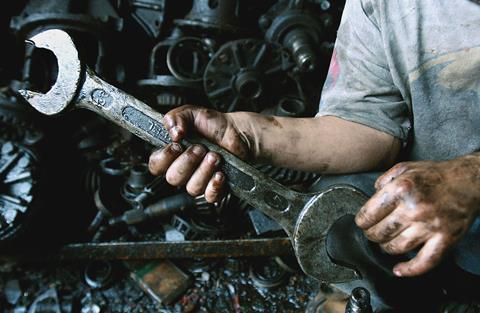Amid a wave of child labor violations across the United States, businesses must take steps to ensure their supply chains are free from illegal work practices
The U.S. Department of Labor announced earlier this week that Tuff Torq was fined nearly $300K for illegally employing minors to operate dangerous equipment, some as young as 14 years old.
It says that division investigators began their probe months ago but obtained clear evidence of the unlawful conduct on Jan. 23, 2024, when they observed a child operating a power-driven hoisting apparatus, an occupation prohibited for workers under the age of 18.

As a result, the department objected to the shipment of goods from the Morristown facility, citing the Fair Labor Standards Act’s “hot goods” provision, which prevents employers from shipping goods produced by oppressive child labor.
The Tennessee manufacturer supplies outdoor power-equipment components for brands such as John Deere, Toro, and Yamaha.
In addition to an agreement to comply with the child labor provisions of the FLSA, payment of the full civil money penalty, and disgorgement of profits, Tuff Torq has agreed to do the following:
- Contract with a community-based organization to provide regular training to staff, managers and contractors.
- Establish an anonymous tip line for reporting child labor and other suspected FLSA violations.
- Allow unannounced and warrantless searches of its facility for three years.
- Refrain from entering any new contracts with staffing agencies or other contractors with child labor violations and require contractors to disclose child labor violations and hiring protocols.
“This consent decree holds Tuff Torq accountable while also discouraging future violations, focusing on the supply chain, and striving to make the victims whole,” said Solicitor of Labor Seema Nanda.
What does this mean for risk managers?
This latest scandal comes amid a wave of child labor violations across the United States, as citations within the past year have reached levels not seen in nearly two decades.
In the fiscal year 2023, the US department of labour investigated 955 cases with child labor violations, involving 5,792 children nationwide, including 502 children employed in violation of hazardous occupation standards.
The department addressed those violations by assessing employers more than $8 million in civil money penalties.
Enterprises are increasingly held responsible for the business practices of third parties and suppliers they work with.
When a public event like this occurs, an enterprise falls into one of several camps:
- Ignorant: the organisation didn’t know that an event was a liability issue for them or others in the industry.
- Negligent: the business knew it was a common issue but did not take action to increase their awareness or to prevent it.
- Tolerant: the company knew it was a possibility but chose to assume the risk and its impact.
- Diligent: the company uses a formal third-party risk management (TPRM) program to reduce the probability of the risk occurring.
- Persistent: A company that continuously promotes operational integrity and assumes responsibility for the business practices of its supply chain.
Dean Alms, Chief Product Officer at Aravo said: “Persistence requires constant communication of your policies and expectations to your extended enterprise and ensuring they adhere to them.
“The cost of being ignorant and negligent can be quite expensive and consequential, while the benefits of being diligent and persistent can be far greater than simply avoiding the high cost of a single disruptive event.”
What can risk managers learn from this event? How should they tackle similar threats?
The Department of Labor’s investigation into Tuff Torq and its findings demonstrate that it is critical that companies identify and mitigate third-party risks, such as labor-law violations, and continuously monitor whether suppliers are compliant.
For example, Alms says that companies need to employ proven TPRM processes, starting with conducting inherent risk assessments and due diligence on direct and indirect suppliers.
They then need to continuously monitor and assess these suppliers to gain a comprehensive view of the risks that the third parties bring into the organisation and proactively develop mitigation plans should these risks materialise.
Alms adds that businesses must conduct onsite audits and inspections at various times, for instance, if a business operates 24 hours, inspections should not be limited to daytime hours. Companies also need to collaborate closely with their third parties and scrutinise suspect credentials.
He concludes: “Finally, if child labor violations have occurred, companies need to own their mistakes and improve business practices.
“In this case, part of the remediation plan is to replace their staffing vendor, re-train onsite personnel about labor laws, and putting the new supplier on a performance evaluation to prevent future incidents.”










No comments yet